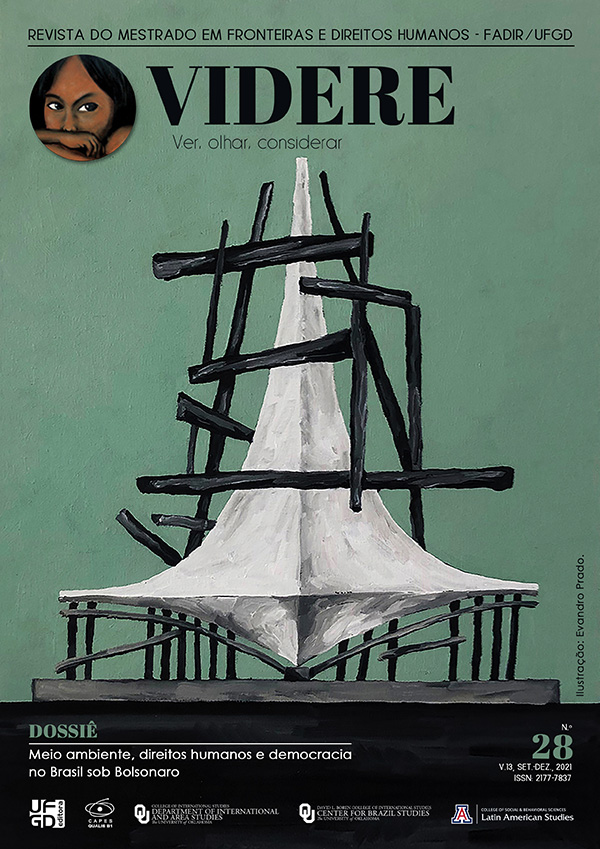Democracy and participation: changes and challenges in Bolsonaro’s government— analyzing brazilian federal decree 9.759/2019
DOI:
https://doi.org/10.30612/videre.v13i28.15272Keywords:
Brazil, Democracy, Participatory bodiesAbstract
Este trabalho busca analisar os impactos do Decreto 9.759/2019 na participação em órgãos deliberativos governamentais. O decreto foi editado pelo governo Bolsonaro no Brasil, extinguindo estruturas participativas. Posteriormente, outros órgãos foram recriados, reduzindo a participação de representantes da sociedade civil. Diante disso, questiona-se: quais impactos essa mudança gera para democracia brasileira? É possível identificar um novo papel para as instituições na participação política sem o debate democrático? Quais seriam as motivações deste decreto? Para isso, este artigo apresenta principais pontos sobre essa norma - órgãos extintos e recriados, as críticas dos movimentos sociais sobre esse contexto, e a ação judicial que questionou essa alteração. Utilizou-se de revisão bibliográfica, análise documental, e coleta de dados sobre os órgãos participativos. O artigo conclui que o processo engendrado pelo decreto gera prejuízos para a democracia participativa no Brasil.
Downloads
References
ABBERS, Rebecca. Conflitos, mobilizações e participação institucionalizada: a relação entre a sociedade civil e a construção de obras de infraestrutura. Brasília: IPEA, 2016. https://www.ipea.gov.br/portal/images/stories/PDFs/TDs/04102016td_2231.pdf.
AVELINO, Daniel P.; ALENCAR, Joana L. O.; COSTA, Pedro C. B. Colegiados nacionais de políticas públicas em contexto de mudanças: equipes de apoio e estratégias de sobrevivência. IPEA: Brasília, 2017. http://repositorio.ipea.gov.br/handle/11058/8112.
AVRITZER, Leonardo. Participatory institutions in democratic Brazil. Baltimore: John Hopkins University Press, 2009.
____________; NAVARRO, Z. (Orgs.). A inovação democrática no Brasil: o orçamento participativo. São Paulo: Cortez, 2003.
____________; WAMPLER, B. The expansion of participatory budgeting in Brazil. Consultancy work project for the World Bank/ MDP-ESA (Africa), 2008.
BRAZIL STF. Suspenso julgamento sobre validade de normas que extinguem conselhos da administração pública federal. 2019a. http://portal.stf.jus.br/noticias/verNoticiaDetalhe.asp?idConteudo=413877.
_________. Supremo suspende regras de decreto presidencial que extingue conselhos federais previstos em lei. 2019b. http://portal.stf.jus.br/noticias/verNoticiaDetalhe.asp?idConteudo=413987.
_________. ADPF 623. 2021. http://portal.stf.jus.br/processos/detalhe.asp?incidente=5774620.
CONAMA. O que é CONAMA? 2021. http://www2.mma.gov.br/port/conama/.
DAGNINO, E. (Org.). Sociedade civil e espaços públicos no Brasil. São Paulo: Paz e Terra, 2002.
DOIMO, Ana Maria. A vez e a voz do popular: movimentos sociais e participação política no Brasil pós-70. Rio de Janeiro: Relume-Dumará, 1995.
FILGUEIRAS, C.; Faria, C. A. (Orgs.). Governo local, política pública e participação na América do Sul. Belo Horizonte: Pontifícia Universidade Católica de Minas Gerais (PUC Minas), 2008.
FISCHER, Frank. Beyond Empiricism: Policy inquiry in post positivist perspective. In: Policy Studies Journal, v. 26, n. 1, p. 129-146, 1998.
HABERMAS, Jürgen. The Structural Transformation of the Public Sphere. Cambridge: Polity Press, 1962/1996.
_________. O conceito de poder de Hannah Arendt. In: FREITAG, Barbara; ROUANET, Sérgio P. (Orgs.). Habermas. São Paulo: Ática, 1976/1993.
_________. The Theory of Communicative Action: Reason and the rationalization of society, vol. 1, e. 2. Cambridge: Polity Press, 1981.
_________. On the Internal Relation Between the Rule of Law and Democracy. In: Constitutionalism and Democracy. London: Routledge, p. 267-276, 2017.
LOTTA, Gabriela (Org.). Teorias e análises sobre implementação de políticas públicas no Brasil. Brasília: Enap, 2019.
MIDLEJ E SILVA, Suylan. Participation in Public Policy: Brazil. In: FARAZMAND, Ali (ed.), Global Encyclopedia of Public Administration, Public Policy, and Governance. Cham, Switzerland: Springer Nature Switzerland AG, 2019.
PAULA, Ana Paes de. Para além dos paradigmas nos Estudos Organizacionais: o Círculo das Matrizes Epistêmicas. In: Cadernos EBAPE.BR, v. 14, n. 1, p. 24-46, 2016.
PAULA, Ana Paes de; SOUZA, Mariana Mayumi Pereira de. Gestão dialógica e tecnologias colaborativas. Curitiba: Editora Appris, 2019.
SADER, Eder. Quando novos personagens entram em cena: falas e lutas dos trabalhadores da Grande São Paulo, 1970-1980. Rio de Janeiro: Paz e Terra, p. 310-311, 1988.
SANTOS, Boaventura de Sousa. O fim do império cognitivo. Coimbra: Almedina, 2018.
SILVA, Filipe Carreria de. Habermas e a esfera pública: reconstruindo a história de uma ideia. In: Sociologia, Problemas e Práticas, n. 35, p. 117-138, 2001.
SILVA, Tatiana Dias. Mudança institucional, discurso e instituições: políticas públicas de igualdade racial no governo federal de 2000 a 2014. Tese de doutorado, Brasília, PPGA/UnB, p. 243, 2019.
SOLÉ, Juli Ponce. La lucha por el buen gobierno y el derecho a una buena administración mediante el estándar jurídico de diligencia debida. Alcalá de Henares: Universidad de Alcalá de Henares, 2019.
TEIXEIRA, Ana Claudia; ALMEIDA, Carla; MORONI, José. A democracia necessária e desejada: dilemas e perspectivas. Marília: Lutas Anticapital, 2020. https://reformapolitica.org.br/2020/07/27/a-democracia-necessaria-e-desejada-dilemas-e-perspectivas.
WALDO, Dwight. Development of Theory of Democratic Administration. In: American Political Science Review, v. 46, n. 1, p. 81-103, 1952.
Downloads
Published
How to Cite
Issue
Section
License
Copyright (c) 2022 Revista Videre

This work is licensed under a Creative Commons Attribution-NonCommercial-ShareAlike 3.0 Unported License.
Authors must accept the publication rules when submitting the journal, as well as agree to the following terms:
(a) The Editorial Board reserves the right to make changes to the Portuguese language in the originals to maintain the cultured standard of the language, while respecting the style of the authors.
(b) Authors retain the copyright and grant the journal the right to first publication, with the work simultaneously licensed under the Attribution-NonCommercial-ShareAlike 3.0 Brazil (CC BY-NC-SA 3.0 BR) that allows: Share - copy and redistribute the material in any medium or format and Adapt - remix, transform, and create from the material. CC BY-NC-SA 3.0 BR considers the following terms:
- Attribution - You must give the appropriate credit, provide a link to the license and indicate whether changes have been made. You must do so under any reasonable circumstances, but in no way that would suggest that the licensor supports you or your use.
- NonCommercial - You may not use the material for commercial purposes.
- Sharing - If you remix, transform, or create from material, you must distribute your contributions under the same license as the original.
- No additional restrictions - You may not apply legal terms or technological measures that legally restrict others from doing anything that the license permits.
(c) After publication, authors are allowed and encouraged to publish and distribute their work online - in institutional repositories, personal page, social network or other scientific dissemination sites, as long as the publication is not for commercial purposes.



















